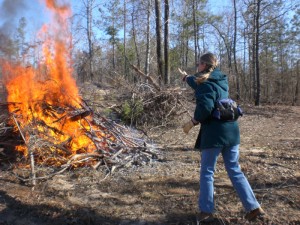We own 88 acres of land. Positioned at the junction of Tallapoosa River bottomland and the resumption of the craggy coastal plain, it’s gorgeous to us. The place where we are building the barn and plan one day to build our house is elevated enough to have a panoramic view of the valley to the south, particularly in the winter when the leaves are off the trees. It has a 1-acre +/- pond and a creek that runs diagonally across it that continued to flow even at the height of the drought in 2007. That’s the good news. Now let’s talk about the challenges.
Just before the seller put it on the market, he opted to harvest it for pines. By and large, they left the hardwoods, but they made no attempt to clean up the mess they made, and the “cut-over” look of the property is pretty daunting. Everywhere we walk (and Amanda and I LOVE to walk, even with
my busted knee), we see downed trees and branches. They litter the forest floor, limit our ability to walk around, and look crappy. Over time, of course, they will decay and nourish the soil, and in the process they are providing habitat for critters of all kinds and sizes, so we have no interest in cleaning up everything. In fact, even if we wanted to we couldn’t; it’s just too big a task for too old farts like us.

Hot fire - feels good on a cold winter day
